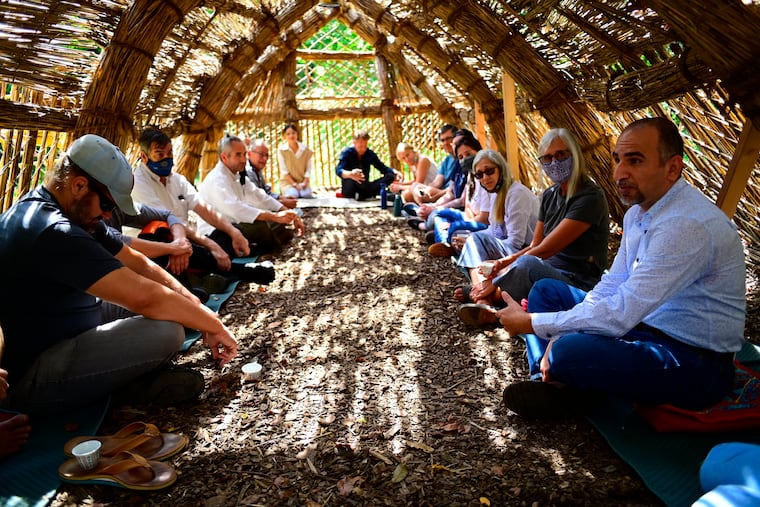On 9/11 anniversary, veterans and refugees seek healing through nature, art, and heart-to-heart
The Schuylkill Center for Environmental Education in Roxborough invited traumatized veterans, refugees, immigrants and citizens to be face-to-face with each other.

Ali Dabbagh found himself able to cry at long last about the day he saw children casually pass by the body of a sniper’s victim outside their Baghdad school in 2004.
“I never shed any tears for all the tragedies,” said the 71-year-old Ardmore resident, who immigrated to the United States in 2014. “I thought I had no feelings because I didn’t shed any tears. But I’m becoming a human being again.”
Dabbagh, an architect and father of three, said he felt “a barrier come down” during an event Saturday at the Schuylkill Center for Environmental Education in Roxborough. “Reconciliation — A Healing Encounter” was held on the 20th anniversary of 9/11 and brought émigrés and American veterans of the Iraq war face to face within a traditional Iraqi structure called a mudhif.
“Seeing people who were not in the service have the courage to sit and listen inspired me,” said Matthew Abbudusky, 36, of Havertown, who served with the U.S. Army in Iraq in 2006 and 2007.
“They listened with open hearts,” said Abbudusky, a United Church of Christ minister.
“I heard that. I felt that.”
With 340 verdant acres of woods and trails, the Schuylkill Center provided a lovely setting for the event. And while the roof of the mudhif was bowed from Hurricane Ida’s winds, people sat on cushions on either side of the dirt floor inside amid an atmosphere that was convivial, but dignified.
The stories, particularly those heard on a 25-minute sound collage created by psychologist and artist Jack Saul, who facilitated the gathering, did not make for easy listening. One American service member described “body parts falling on my humvee” after watching a child soldier toss a grenade. “It was either me or him,” the man said. “I pulled my rifle out.”
Saul is the director of a “public arts and conversation project” called Moral Injuries of War, which focuses on the psychological wounds veterans, civilians, and journalists can experience during wartime.
“Moral injury is a problem of conscience,” he said. “It is the shame and the guilt associated with having perpetrated, witnessed, or not having been able to prevent actions that were morally reprehensible. It’s a wound to the soul.”
One of the service members who sat quietly in the mudhif was Leroy Enck, 38, of South Philly; he participates in a group therapy program at the VA Medical Center in Philadelphia for veterans suffering from moral injury.
During an interview, Enck, who grew up in Lancaster County, said he joined the Marines right out of high school and ended up serving during three deployments in Iraq. He described witnessing a baby shot in the head; he also saw a ravenous dog eating the corpse of a soldier.
Enck, a soft-spoken father of a 6-year-old daughter, said he saw the reconciliation event as “an opportunity for transformation” for American civilians who might “come away with a new perspective” about those who have served.
Iraqi refugee and artist Yaroub al-Obaidi, who lives in Mount Airy, was among those gathered in the mudhif, which he designed in collaboration with Seattle artist Sarah Kavage, who also was present. Part of the Lenapehoking Watershed, or Delaware River Watershed, environmental art project, the structure, made of thatched reeds, was damaged but still standing after the remnants of Hurricane Ida.
The idea for the 9/11 event arose as the mudhif was being built last June from conversations among volunteers, including refugees from Afghanistan and Iraq and military veterans of the conflicts in those countries, who worked alongside one another, said Tina Plokarz, the Schuylkill Center’s director of environmental art.
“During the construction time of two weeks, it was very intense and beautiful how people came again and again and connected with each other,” she said. “We wanted to build on the healing process that had started. And what better time to do so than the 9/11 anniversary?”
Obaidi, 43, who came to Philadelphia from Baghad in 2016, said a mudhif can have many functions, including a place for people to have “difficult conversations.”
Elizabeth Ellman, an assistant director at the center, served with the U.S. Army in Kuwait.
“It’s not just the military veterans or refugees who need healing,” she said. ”Everyone has been devastated by the events that have occurred. We need to put down any type of differences and open our arms and help each other. We’re all in this together.”
Saul, who lived in Lower Manhattan with his two young children during 9/11, said Saturday’s event also suggested that in addition to mourning victims of terrorism and understanding the challenges faced by veterans, Americans also need to reckon with the cost of warfare as a default strategy.
“I’m thinking about the importance of gatherings like this, where silence is broken,” said Kelly Denton-Borhaug, a professor of global religious, peace, and justice studies at Moravian University in Bethlehem, Pa., as the session inside the mudhif drew to a close.
“I was struck by the voice of the veteran who talked about how he wanted to say something about turning his rifle on a child,” Denton-Borhaug said. “I’m thinking of how difficult it must be to go through something like that, and not be permitted to talk about that. I’m thinking of the importance of gatherings like this, where silence is broken.”